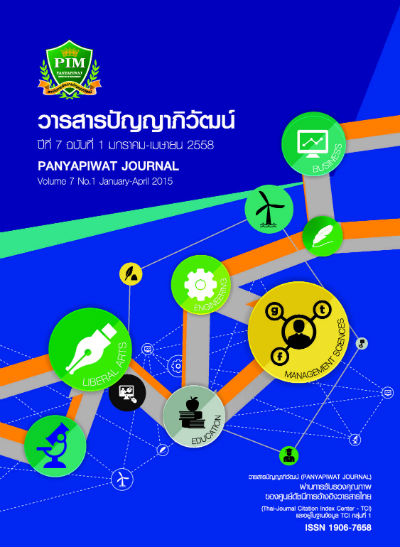คุณสมบัติส่วนบุคคล อิทธิพลทางสังคม และความซื่อสัตย์ที่มีผลต่อภาวะผู้นำที่แท้จริงของนักเรียนมัธยมศึกษาตอนต้น โรงเรียนในเครือเซนต์ปอล เดอ ชาร์ตร
Main Article Content
บทคัดย่อ
การวิจัยครั้งนี้มีวัตถุประสงค์เพื่อศึกษา 1) คุณสมบัติส่วนบุคคล อิทธิพลทางสังคม และความซื่อสัตย์ ของนักเรียนมัธยมศึกษาตอนต้น 2) ภาวะผู้นำที่แท้จริงของนักเรียนมัธยมศึกษาตอนต้น และ 3) ความสัมพันธ์เชิงสาเหตุ ของคุณสมบัติส่วนบุคคล อิทธิพลทางสังคม ความซื่อสัตย์ ส่งผลต่อภาวะผู้นำที่แท้จริงของนักเรียนมัธยมศึกษาตอนต้น เป็นการวิจัยผสมผสานทั้งเชิงปริมาณและเชิงคุณภาพ โดยเชิงปริมาณกลุ่มตัวอย่าง ได้แก่นักเรียนมัธยมศึกษาตอนต้น จำนวน 364 คน จาก 10 โรงเรียน สุ่มตัวอย่างแบบสัดส่วน เครื่องมือที่ใช้ ได้แก่ แบบสอบถาม สถิติที่ใช้ในการวิจัย ได้แก่ ค่าเฉลี่ย ส่วนเบี่ยงเบนมาตรฐาน และการวิเคราะห์ถดถอยพหุแบบขั้นตอน ส่วนเชิงคุณภาพ กลุ่มตัวอย่าง ได้แก่ ผู้อำนวยการ 3 คน ผู้ปกครอง 3 คน ครู 3 คน และเพื่อนนักเรียน 3 คน โดยเลือกกลุ่มตัวอย่างแบบเฉพาะเจาะจง เครื่องมือที่ใช้ ได้แก่ แบบสัมภาษณ์ชนิดเจาะลึก และวิเคราะห์ข้อมูลด้วยเทคนิควิเคราะห์เนื้อหา ผลการวิเคราะห์ พบว่า นักเรียน กำลังศึกษาในชั้นมัธยมศึกษาปีที่ 1 มากที่สุด ส่วนใหญ่เป็นนักเรียนหญิง มีอายุเฉลี่ย 13 ปี ผู้ปกครองมีรายได้โดยเฉลี่ยเดือนละ 27,128 บาท การดำเนินชีวิตสภาวะผู้นำที่แท้จริงของนักเรียน ได้รับอิทธิพลจากผู้ปกครอง ครู เพื่อนนักเรียนและความซื่อสัตย์ ในภาพรวมอยู่ในระดับมาก จากการศึกษาในเชิงคุณภาพ พบว่า อิทธิพลทางสังคมและความซื่อสัตย์ส่งผลต่อภาวะผู้นำที่แท้จริง ซึ่งสอดคล้องกับผลการวิเคราะห์เชิงปริมาณ ที่ พบว่า อิทธิพลทางสังคม ความซื่อสัตย์ เพศ มีความสัมพันธ์ทางบวกกับภาวะผู้นำที่แท้จริง ส่วน อายุมีความสัมพันธ์ทางลบกับภาวะผู้นำที่แท้จริงอย่างมีนัยสำคัญทางสถิติที่ระดับ 0.01 โดยมีความสัมพันธ์กันในระดับต่ำ (R2 = .352)
Article Details
“ข้าพเจ้าและผู้เขียนร่วม (ถ้ามี) ขอรับรองว่า บทความที่เสนอมานี้ยังไม่เคยได้รับการตีพิมพ์และไม่ได้อยู่ระหว่างกระบวนการพิจารณาลงตีพิมพ์ในวารสารหรือแหล่งเผยแพร่อื่นใด ข้าพเจ้าและผู้เขียนร่วมยอมรับหลักเกณฑ์การพิจารณาต้นฉบับ ทั้งยินยอมให้กองบรรณาธิการมีสิทธิ์พิจารณาและตรวจแก้ต้นฉบับได้ตามที่เห็นสมควร พร้อมนี้ขอมอบลิขสิทธิ์บทความที่ได้รับการตีพิมพ์ให้แก่สถาบันการจัดการปัญญาภิวัฒน์หากมีการฟ้องร้องเรื่องการละเมิดลิขสิทธิ์เกี่ยวกับภาพ กราฟ ข้อความส่วนใดส่วนหนึ่งและ/หรือข้อคิดเห็นที่ปรากฏในบทความข้าพเจ้าและผู้เขียนร่วมยินยอมรับผิดชอบแต่เพียงฝ่ายเดียว”
เอกสารอ้างอิง
ธนกฤต ดีพลภักดิ์. (2556). การเปิดรับสื่อ พฤติกรรม และผลกระทบจาการเล่นเกมออนไลน์ประเภท MMORPG (Massively Multiplayer Online Role-Playing Game) ของนักเรียนมัธยมศึกษาตอนปลายในเขตกรุงเทพมหานคร. วารสารปัญญาภิวัฒน์, 5 (ฉบับพิเศษ), 69.
นกุล ว่องฐิติวงศ์. (2550). เด็กในวันนี้คือผู้ใหญ่ในวันหน้า. สืบค้นเมื่อ 31 พฤษภาคม 2550, จาก www.kriengsak.com/node/49
นภดล กรรณิกา. (2556).เอแบคโพลชี้คนไทยยอมรับมีคอรัปชั่นทุกวงการ. สืบค้นเมื่อ 27 กันยายน 2556, จาก www.dailynews.co.th/politics/191035.-แคช
ปานเทพ กล้าณรงค์ราญ. (2553). ชี้ราชการทุจริต 200 เรื่องต่อเดือน แนะแก้ปัญหาที่จิตใจคน. สืบค้นเมื่อ 17 กุมภาพันธ์ 2555, จาก https://www.thairath.co.th/content/pol/137370
วิชิตวงศ์ ณ ป้อมเพชร. (2010). สิงคโปร์กับไทย:บทความ. สืบค้นเมื่อ 13 ตุลาคม 2556, จาก www.komchadluek.net/detail/20100607/61928/สิงคโปร์กับไท.html
พสุ เดชะรินทร์. (2551). ผู้นำที่ดีต้องเริ่มจากการรู้จักตนเอง. สืบค้นเมื่อ 9 ธันวาคม 2551, จาก pasu@acc.chula.ac.th
ภารดี อนันต์นาวี. (2547). การวิเคราะห์ภาวะผู้นำของนิสิตสตรีระดับปริญญาโท สาขาการบริหารการศึกษา คณะศึกษาศาสตร์ มหาวิทยาลัยบูรพา. สืบค้นเมื่อ 19 กุมภาพันธ์ 2555, จาก www.edu.buu.ac.th/journal/.../Link_Jounal%20edu17_2_5.pdf
สุเทพ พงศ์ศรีวัฒน์. (2554). ภาวะผู้นำ. สืบค้นเมื่อ 12 สิงหาคม 2553, from www.novabizz.com/NovaAce/Relationship/ภาวะผู้นำ.htm
สัมมา รธนิชย์. (2553). ภาวะผู้นำของผู้บริหาร. พิมพ์ครั้งที่ 2. กรุงเทพฯ: สำนักพิมพ์ข้าวฟ่าง.
Avolio, B. J. & Gardner, W. L. (2005). Authentic leadership development: Getting to the root of positive forms of leadership. The Leadership Quarterly 16. 315- 338.
Babbie, E. (2001). The practice of social research. Retrieved December 13, 2011, from books.Google.com/books/about/The_Practice_of_Social_Research.htm?id
Colossians. (2009). Do not lie to one another. Retrieved April 1, 2010, from https://www.biblegateway.com/passage/?...Colossians
Curry, A. & Kadasah, N. (2002). Focusing on key elements of TQM-evaluation for sustainability. The TQM Magazine. 14(4), 207.
Dunbar, G. (2004). Schools, firm play role in teaching ethics. Retrieved April 8, 2012, from www. org/programs/integrity-works/pdf/ai_abstracts.pdf
Fry, L. W. (jody) & Whittington J. L. (2005).In search of authenticity: spiritual leadership theory as a source for future theory, research, and practice on authentic leadership. Retrieved July 12, 2009, from http://www.google.co.th/
Ibukun, O. & Abe. (2011).Personality characteristics and principal leadership –Effectiveness in Ekiti State, Nigeria. Retrieved August 15, 2011, from www.regent.edu/.../5Ibukun Oyewole
Ilies, R., Morgeson, F. P. & Nahrgang J. D. (2005). Authentic leadership and eudemonic well-being: Understanding leader-follower outcomes. The leadership Quarterly. 16, 373-394.
Kohlberg, L. (1964). Lawrence Kohlberg’sstages of moral development. Retrieved May 28, 2010, from en.wikipedia.org/.../
LawrenceLauglo, J. & Oia, T. (2008). Policy Futures in Education. Retrieved March 11, 2009, from www.wwwords.co.uk/pfie/6/issue6_2.asp
Leviticus. (2006). You must not deal unjustly in judgment. You must neither show partiality to the poor nor honor the fellow citizen fairly. Retrieved April 1, 2010, from www.vatican.va
Lloyd, J. M. (2006). Predicting leadership: characteristics associated with student leadership. Retrieved October 30, 2011, from www.polyusf.edu/Documents/.../Lloyd. JanM-200605-phd.pdf
Luthans, F. & Avolio, B. J. (2003). Authentic leadership development: Getting to the root of Positive.Retrieved May 6, 2012, from www.heyleadership.com/.../Authentic%20Leadership%20Developmeent%20
Mead, M. (1928). Margaret Mead and the study of socialization. Retrieved August 12, 2010, from http:onlinelibrary,wiley.com/doi/10.1525/eth.1975.3.2.02aooo20/pdf
Moreillon, J. (2001). Address. 20th APR Scout conference report 24 October 2001. Retrieved January 12, 2008, from www.scoutthailand.org
Schoenberg, J, Salmond, K. & Fleshman, P. (2008).Change It up! What Girls say About Rede ining Leadership. New York: Girl Scouts of the USA.
Shar, S. (2009). Impact of teacher’s behaviour on the academic achievement of university students.Retrieved April 4, 2010, from www.ea.sinica.edu.tw/eu_file/127710164514.pdf
Sharmir, B. & Eilam, G. (2005). What’s your story? A life-stories approach to authentic Leadership development. The leadership Quarterly. 16, 397.
Skjei, S., Mccaleb L. C. & Wilding M. (2006). Authenticity and intergrity what is inside the “blackbox” of leadership. Retrieved July 2, 2008, from www.naropa.edu/extend/marpa/documents/
Wheatley, M. (1999). Leadership a New World View. Retrieved November 23, 2009, from tbonnington.Tripod.com/quantumgazette12id1.html
Yamane, T. (1973). Statistics: an introductory analysis. Retrieved August 1, 2010, from library.utee.ac.th/Opac/norm_detail.asp?bib_no=000000000035161
Translated Thai References
Anannawi, P. (2004). Analysis of Student Leadership Women’s Masters Major. Field of Education University. Retrieved February 19, 2012, from www.edu.buu.ac.th/journal/.../Link_Jounal%20edu17_2_5.pdf [in Thai]
Diphonphak, T. (2013). Media Exposure and Behavioral Effects of MMORPG Online Gaming of high School Students in Bangkok Metropolitan. Panyapiwat Journal, 5(special Issue), 69. [in Thai]
Decharin, P. (2019). How is Authentic Leadership. Retrieved December 9, 2019, from pasu@acc.chula.ac.th [in Thai]
Kannika, N. (2013). Poll indicated that Thailand had accepted all the corruption. Retrieved September 27, 2014, from www.dailynews.com.th/politics/191035 [in Thai]
Klanarongran, P. (2011). Corruption in government, about per month, suggestion Solutions to mind. Retrieved February 17, 2012, https://www.thairath.co.th/content/pol/137370 [in Thai]
Pomphet, N. W. (2010). Singapor and Thailand. Article. Retrieved October 13, 2014, from www.komchadluek.net/detail/20100607/61928/สิงคโปร์กับไท.html [in Thai]
Phonsiwat, S. (2010). Leadership. Retrieved August 12, 2010, from www.novabizz.com/NovaAce/Relationship/ภาวะผู้นำhtml [in Thai]
Ratnit, S. (2010). Leadership Management. (2nd ed.). Bangkok: Kaophang. [in Thai]
Wongthitiwong, N. (2007, May 27). Today’s children are tomorrow’s adults. Retrieved May 31, 2007, from www.kriengsak.com/node/49 [in Thai]


